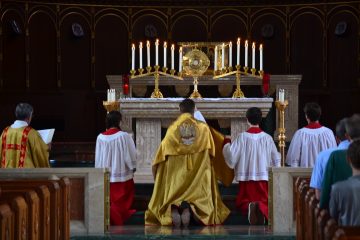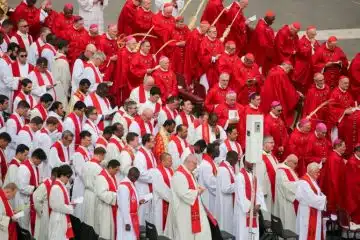Priests told ministry to married, engaged couples crucial to church
Wednesday, November 18, 2009
COLUMBUS — Priests from across Ohio were told at a statewide convocation that their work with married and engaged couples is crucial in creating a “marriage-building church” in an era when the secular culture seems to place a low priority on the stability of marriage and family life.
The convocation, believed to be the first such gathering of priests from all six of Ohio’s dioceses, took place Nov. 5-6 in Columbus.
The Catholic Conference of Ohio, which organized the event, said about 670 of the more than 1,000 priests who serve in Ohio as diocesan clergy, members of religious orders and priests of Eastern Catholic churches attended.
 |
| Priests from throughout Ohio gathered in Columbus to discuss ways to help couples in their vocation to marriage. (CNS photo/CatholicTimes/Jack Kustron) |
Ohio’s bishops decided earlier this year to call their priests together so they could talk about the U.S. bishops’ proposed pastoral letter on marriage offering support to married couples and affirming that true marriage can only involve a man and a woman.
The bishops were to debate and vote on the document during the their fall general assembly Nov. 16-19 in Baltimore.
“A pastoral letter like this is a fairly rare event, and the state’s bishops felt it was important enough that it merited this kind of gathering in which all our priests could hear the same information at the same time and be better able to spread it to their parishes,” said Bishop R. Daniel Conlon of Steubenville, convocation chairman, who helped draft the letter.
The proposed document is another component of the bishops’ National Pastoral Initiative for Marriage, which began in November 2004.
Archbishop Joseph E. Kurtz of Louisville, Ky., was principal speaker for the Ohio event. He chairs the bishops’ Ad Hoc Committee for the Defense of Marriage.
He told the priests that the importance and urgency of their role in strengthening marriages and attitudes toward marriage is greater than many of them may realize.
He said a five-year nationwide study of more than 3,000 youths of all types of faith backgrounds by University of Notre Dame sociology professor Christian Smith, published this year as a book titled Souls in Transition, showed parents and parent substitutes, such as priests, were the most important factor in determining the religious attitudes of young people.
He also urged priests and others in marriage ministry to be leaders in getting newly married couples to become involved in church activities.
“In our research on the initiative, we often heard from couples who said that ‘when we got married, we felt the church considered us to be a completed project,’” he said. “Not following up with them means you’re missing a tremendous opportunity at your doorstep.”
He said one main reason behind the bishops’ marriage initiative was a nationwide decline of 48 percent between 1980 and 2008 in the number of couples who could have been married in a Catholic sacramental ceremony, but chose not to do so.
The archbishop said that in focus groups of people ages 18 to 30 who were gathered to discuss attitudes toward marriage as part of the process for the initiative, “you often would hear people who would say that although they admired the sacrifice and saving love of Jesus Christ, it was not for them.”
“They said they were fearful they would get hurt and were not willing to sacrifice for someone they loved,” he said.
He said that although society does not appear to be supportive of stable marriages today, the experience of the pro-life movement provides an example of how attitudes toward spiritual matters can change.
“In the mid-1990s, it was alarming that support for those who favored abortion was running as high as 57 percent. Today, the Gallup Poll is saying that 56 or 57 percent of those questioned say they’re pro-life,” he said.
“Attitudes can change, and we can help change them with the resolve to make a difference and the capacity to be equipped to be good pastoral agents,” he added.
Archbishop Kurtz said in the proposed pastoral the bishops tackle “the hard issues of the culture,” such as contraception, same-sex unions, easy divorce and cohabitation before marriage.
He said the bishops also emphasize that “marriage is not a private affair.”
“It affects the children, the church, the neighborhood and society and its implications in all those areas can’t be ignored.
“The Supreme Court’s Roe v. Wade decision legalizing abortion emphasized the kind of private decision that has public consequences,” Archbishop Kurtz said in an interview before his speech with the Catholic Times, Columbus’ diocesan newspaper.
“Like many such decisions, it was the result of what society already was embracing. It was part of the broader attitude that people marry for self-fulfillment rather than sacrificial love,” he said.
He said modern culture has made it “too easy for marriage to fail” because of the ready availability of divorce, while “the church is the last one to give up” on the idea that a marriage cannot be saved.
However, he said the bishops also recognize instances in which divorce may be the only solution to a marriage, particularly in cases of spousal abuse.
Additionally, the church has made greater use of the annulment process in recent years to dissolve marriages which have been shown to be fundamentally flawed, he said.
“The church always has been willing to recognize such instances and to reach out to people in need, offer them its understanding and support, and invite them to make frequent use of the sacraments,” especially reconciliation and the Eucharist, the archbishop said. — CNS













